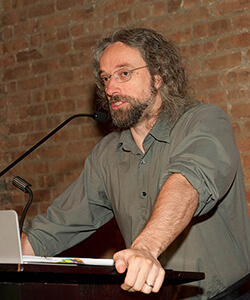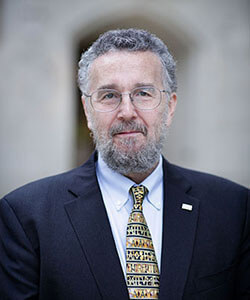Summary

One mark of a “good” scientist is the ability to address issues of the unknown in a way that allows for further research and deeper engagement – what Matthew Stanley calls “productive uncertainty.” This outlook is rarely discussed within science, but arises from unspoken values and virtues demonstrated through practice. In this lecture, Stanley will discuss how three important scientists – James Clerk Maxwell (1831–79), Arthur Stanley Eddington (1882–1944), and Carl Sagan (1934–96) – grappled with questions of productive uncertainty, and, in particular, how they justified their values of productive uncertainty and what resources they drew on for those justifications. Stanley will argue that all three drew on religious values to help articulate and support their scientific practices. Coming from different religious contexts – conservative, liberal, and secular – they help demonstrate the variety of ways scientific virtues can interact with and depend on wider categories.
Speaker
Prof. Matthew Stanley teaches and researches the history and philosophy of science at New York University – Gallatin. He holds degrees in astronomy, religion, physics, and the history of science and is interested in the connections between science and the wider culture. He is the author of Practical Mystic: Religion, Science, and A. S. Eddington, which examines how scientists reconcile their religious beliefs and professional lives, and Huxley’s Church and Maxwell’s Demon, which explores how science changed from its historical theistic foundations to its modern naturalistic ones. His current project is a history of scientific predictions of the end of the world. Stanley is also part of a nationwide National Science Foundation-funded effort to use the humanities to improve science education in the college classroom. He has held fellowships at the Institute for Advanced Study (Princeton, NJ), the British Academy, and the Max Planck Institute. He currently runs the New York City History of Science Working Group. Professor Stanley was awarded a 2014–15 Gallatin Dean’s Award for Excellence in Teaching.
Respondent

Don Howard is a Professor in the Department of Philosophy at the University of Notre Dame and holds degrees in physics and philosophy. He is a Fellow and former Director of the Reilly Center for Science, Technology, and Values, and is co-director of the Reilly Center’s Ethics of Emerging Technologies focus area. A Fellow of the American Physical Society, Past Chair of APS’s Forum on the History of Physics and the APS Committee on International Freedom of Scientists, Howard is an internationally recognized expert on the history and philosophy of modern physics, especially the work of Einstein and Bohr. Howard is also the co-founder (1990) of the International Society for the History of Philosophy of Science and was founding co-editor of its journal, HOPOS. He also writes and teaches on the ethics of science and technology. Co-editor of The Challenge of the Social and the Pressure of Practice: Science and Values Revisited, Howard has led NSF-funded workshops on science and ethics and is currently the lead PI on an NSF-EESE research ethics grant. He has also served as the Secretary of the International Society for Military Ethics. Among his current research interests are ethical and legal issues in cyberconflict and cybersecurity, as well as the ethics of autonomous systems.
Free and open to the public. Registration through Eventbrite required.
Location
University of Notre Dame (U.S.A.) in England
1-4 Suffolk Street
London, SW1Y 4HG
This event is a part of the Practicing Science: Virtues, Values, and the Good Life conference. It is made possible by support from the Templeton Religion Trust.
Originally published at ctshf.nd.edu.